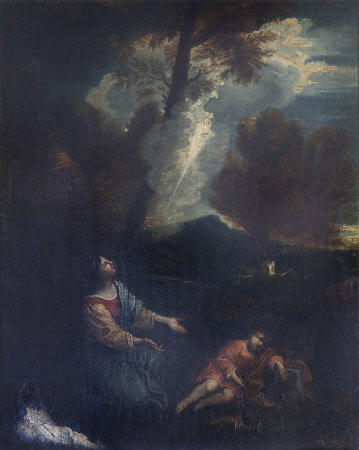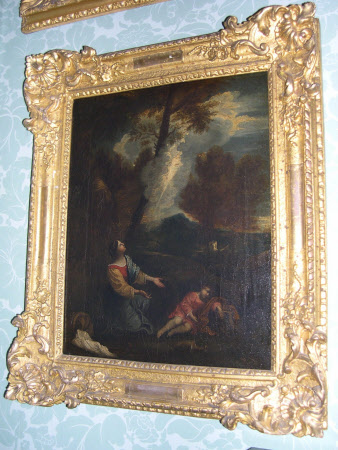Hagar and Ishmael in the Desert, rescued by the Voice of an Angel (after Pier Francesco Mola)
Amelia Sophia Hume, Lady Brownlow (1788-1814)
Category
Art / Oil paintings
Date
1809 (signed and dated)
Materials
Oil on canvas
Measurements
749 x 394 mm (29 ½ x 15 ½ in)
Place of origin
England
Order this imageCollection
Belton House, Lincolnshire
NT 435953
Caption
Elizabeth Cust was, like a number of other noblewomen of her day, including the Countess of Morley at Saltram and Viscountess Anson at Shugborough - an accomplished copyist of Old Masters in oils. She was the daughter of the 1st Lord Brownlow, and, as well as being a painter, compiled a scholarly catalogue of the pictures at Belton. This picture is after the High Baroque artist, Pier Francesco Mola, who was mainly active in Rome. It illustrates the story of Hagar and Ishmael in the wilderness, from the book of Genesis. This type of painting was popular in 17th century Rome, with scenes set in expanses of idyllic landscape reminiscent of the Roman countryside.
Summary
Oil painting on canvas, Hagar and Ishmael in the Desert, rescued by the Voice of an Angel (after Pier Francesco Mola) by Amelia Sophia Hume, Lady Brownlow (1788-1814), signed and dated on the reverse 1809. Two figures, one in attitude of supplication looking at a stormy sky the other lying on the ground. The artist, Amelia Sophia Hume, was born on 31 July 1788 and was the younger daughter of Sir Abraham Hume, 2nd Bt. and Lady Amelia Egerton. She was baptised on 11 September 1788 at Wormley, Hertfordshire. She married John Cust, later 1st Earl Brownlow, son of Brownlow Cust, 1st Baron Brownlow of Belton and Frances Bankes, on 24 July 1810 at St. George's Church, St. George Street, Hanover Square, London. She died on 21 February 1814 at age 25 She is commemorated by Canova's monument in Belton Church. Sophia Hume evidently inherited her father Abraham's interest in Old Masters and ability to copy them. It is interesting, however, that despite the original’s following the visual tradition of showing the angel as a physical presence, she preferred to follow the Bible, which says only: “…and the angel of God called to Hagar out of heaven, and said unto her, What aileth thee Hagar? fear not, for God hath heard the voice of the lad where he is” (Genesis, xxi.17).
Provenance
Purchased with a grant from the National Heritage Memorial Fund (NHMF) from Edward John Peregrine Cust, 7th Baron Brownlow, C. St J. (b.1936) in 1984
Credit line
Belton House, The Brownlow Collection (acquired with the help of the National Heritage Memorial Fund by the National Trust in 1984)
Makers and roles
Amelia Sophia Hume, Lady Brownlow (1788-1814), publisher after Pier Francesco Mola (Coldrerio 1612 – Rome 1666), publisher

